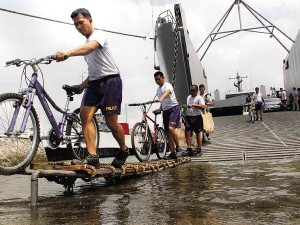Donated bikes keep pupils in school

PHILIPPINE Navy personnel help unload the 190 bicycles from the BRP Dagupan that will be distributed to students of a foundation in Cebu City and a public school in Bohol province. CONTRIBUTED PHOTO
WHILE DRIVING some tourists to Baclayon town in Bohol province in 2011, businessman Joel Uichico saw some children walking to school. How far did they walk just to get an education? he wondered.
The image inspired him to start an advocacy to help the children: Give them bicycles.
Since his Bikes for the Philippines (BfP) was formally launched in December 2011, Uichico has distributed more than 700 bicycles to beneficiaries in the provinces of Bohol, Cebu and Batangas.
His personal cause grew into a collective effort of groups and individuals who, like him, wanted to arrest the high drop-out rate in the country’s schools. Uichico believed that the children’s difficulty in going to school was among the reasons for this development.
Bicycles have been given to students of the Alternative Learning System (ALS) (100 bikes) and Baclayon National High School (306), both in Baclayon town; Pagnituan National High School in Maribojoc town in Bohol (135); Habitat for Humanity in Batangas province (50), and Lord Who Cares Foundation in Cebu City (55).
Article continues after this advertisementOthers reached needy students in as far as Calatagan town in Batangas.
Article continues after this advertisementOn July 30, the Department of Education and the BfP signed a memorandum of agreement for the group to provide P600,000 worth of bicycles to students of Baclayon National High School, as well as to train them in proper bike handling and maintenance.
“This will not only help them get to school but also provide a way to teach road safety and environmentalism,” Education Secretary Armin Luistro said in a statement.
Luistro directed the department’s field offices to help identify other students who could benefit from the program.
Uichico, BfP executive director, said his group had volunteers, mostly cyclists and bike enthusiasts, who could look for donors and distribute the bicycles.
When he first thought of giving out bicycles to poor students so they could get to school faster, he said he did not intend to put up an organization. He asked his cousin, Jo Grant, who is based in the United States, to see if she could acquire donated bikes and send them to the Philippines.
They were able to come up with a partnership with the Bikes for the World, a nonprofit organization based in Washington, but it required Uichico to put up an organization. Thus, the BfP was born.
Baclayon was chosen as a pilot area, where Uichico has spent six years in developing its eco-tourism through the Baclayon Recreational and Aquatic Activities.
The first donation came in
July 2011 from Filipino architect Joel Esguerra who works for Gensler, a US-based company. The bicycles were of the “high breed” type, a combination of road and mountain bikes.
Shipping costs were shouldered at that time by Peacock Garden Resort in Baclayon.
Uichico oversees the shipping and distribution of the bicycles. His son, Adrien, helps him recruit volunteers.
Not all children are given bicycles because they need to first pass several screening tests.
“We have to choose from those who belong to the poorest of the poor,” Uichico said. This meant that the family of the beneficiary should not have a monthly income of more than P6,000.
Another consideration is where the beneficiaries live.
Some beneficiaries live
3 kilometers away from school, while others, though they live nearer, go through roads that are rough and steep.
The beneficiaries and the parents are interviewed and informed of what are expected from them once they get the bicycles.
“Once accepted, the beneficiary goes through extensive training in bike safety and maintenance. Mentors within the community are sought out to help build self-esteem and sharpen bike-handling skills,” Uichico said.
“Bike helmets are provided and mandatory to be worn, and insurance is made available to alleviate family concerns of biking injuries,” he added.
First to train were the ALS students.
“Once the older students are trained, they become mentors to the younger students. The BfP mentoring process also continues through the school system,” Uichico said.
An advisory council in Baclayon was established to monitor the program.
Uichico stressed that the grades and school attendance of the beneficiaries were monitored since the program aims to decrease the drop-out rate.
On Sept. 3, Uichico was in Cebu to receive the second shipment of 190 bicycles from Manila, which were unloaded from the BRP Dagupan of the Philippine Navy. It came with one sewing machine and three balikbayan boxes of books, assorted bicycle spare parts, helmets and tires.
Fifty-five bicycles were donated to the Lord Who Cares Foundation in Barangay Busay, Cebu City, which caters to out-of-school youth and abused children who want to go back to school. The rest were shipped to Pagnituan National High School in Maribojoc town.
Bonifacio Bonhayag Jr., a BfP volunteer who got in touch with Uichico through the program’s Facebook account, said he had found a sense of fulfillment by helping in the program.
“I also experienced taking long walks from our house to school. I know how difficult it is,” he said.